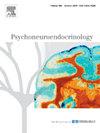Association between brain-gut peptides and depression: A systematic review and meta-analysis
IF 3.6
2区 医学
Q2 ENDOCRINOLOGY & METABOLISM
引用次数: 0
Abstract
Background and objectives
Depression is a chronic mental disorder that has emerged as one of the most prevalent global public health concerns, with its incidence increasing annually. Brain-gut peptides, various gastrointestinal (GI) hormones secreted by the central nervous system, enteric nervous system, and GI tract, have been demonstrated by numerous studies to play a pivotal role in the pathophysiology of depression. This systematic review and meta-analysis was undertaken to examine the association between brain-gut peptide concentrations and depressive disorders.
Materials and methods
A comprehensive search was conducted across the CNKI, WanFang Database, VIP, PubMed, Embase, Cochrane Library, and Web of Science databases for observational studies investigating the relationship between brain-gut peptide levels and depression. Included studies comprised cross-sectional investigations with clearly defined data collection time points, case-control studies with comparable demographic characteristics across groups, and cohort studies in which participants were initially free of depression and followed longitudinally. Studies were excluded if they were duplicates, non-Chinese/English publications, lacked outcome data or accessible full texts, involved secondary depression (e.g., postpartum, post-stroke), included comorbid depression with other conditions, or did not report extractable corrected effect sizes. The search was limited to articles published up to November 2024. Odds ratios and corresponding 95 % confidence intervals were used to assess risk relationships. Heterogeneity was evaluated using the Q test. When using the fixed effects model, there was statistical homogeneity between studies (P > 0.10, I² < 50 %). Conversely, a random-effects model was utilized in the presence of significant heterogeneity (P < 0.10, I² > 50 %), with further exploration of potential sources of heterogeneity. Sensitivity analysis was conducted by sequential exclusion of individual studies to evaluate the robustness of the results and to determine whether any single study disproportionately influenced the overall effect size.
Results
A total of 4870 studies were identified, of which 44 met inclusion criteria and were incorporated into the final analysis (inter-rater agreement for the study selection, κ = 0.82; inter-rater agreement for data extraction, ICC=0.91, κ=0.89) involving 4557 participants were included. The meta-analysis revealed that serum levels of substance P (SP), cholecystokinin (CCK), and ghrelin were elevated in the depression group compared to controls. Both the bipolar and unipolar depression subgroups exhibited significantly higher serum SP levels relative to controls. Moreover, no significant differences in serum leptin (LEP) levels were observed between the depression and control groups, nor between male and female subgroups among depressed and non-depressed individuals.
Conclusion
The findings suggest that increased serum concentrations of SP, CCK, and ghrelin are associated with depressive disorders, highlighting their potential as important biomarkers for the detection of depression. In contrast, the role of LEP in depression remains inconclusive and warrants further investigation.
脑肠肽与抑郁症之间的关系:一项系统综述和荟萃分析
背景与目的抑郁症是一种慢性精神障碍,已成为全球最普遍的公共卫生问题之一,其发病率每年都在增加。脑肠肽是由中枢神经系统、肠神经系统和胃肠道分泌的各种胃肠道激素,已被大量研究证明在抑郁症的病理生理中起着关键作用。本系统综述和荟萃分析旨在研究脑肠肽浓度与抑郁症之间的关系。材料与方法通过中国知网、万方数据库、维普、PubMed、Embase、Cochrane图书馆和Web of Science数据库全面检索脑肠肽水平与抑郁症关系的观察性研究。纳入的研究包括具有明确定义的数据收集时间点的横断面调查,具有跨组可比较的人口统计学特征的病例对照研究,以及参与者最初无抑郁症并进行纵向随访的队列研究。如果研究是重复的、非中文/英文出版物、缺乏结局数据或可获得的全文、涉及继发性抑郁(如产后、中风后)、包括抑郁症合并其他疾病、或没有报告可提取的校正效应量,则排除研究。搜索仅限于2024年11月之前发表的文章。比值比和相应的95 %置信区间用于评估风险关系。采用Q检验评估异质性。采用固定效应模型时,各研究间存在统计学上的同质性(P >; 0.10,I²<;50 %)。相反,在存在显著异质性的情况下,采用随机效应模型(P <; 0.10,I²>;50 %),进一步探索异质性的潜在来源。通过顺序排除单个研究进行敏感性分析,以评估结果的稳健性,并确定是否有任何单个研究不成比例地影响总体效应大小。结果共纳入4870项研究,其中44项符合纳入标准,纳入最终分析(研究选择的评分间一致性,κ = 0.82;数据提取的评分间一致性,ICC=0.91, κ=0.89),共纳入4557名受试者。荟萃分析显示,与对照组相比,抑郁症组血清P物质(SP)、胆囊收缩素(CCK)和胃饥饿素水平升高。双相抑郁和单相抑郁亚组的血清SP水平均明显高于对照组。此外,血清瘦素(LEP)水平在抑郁组和对照组之间没有显著差异,在抑郁和非抑郁个体的男性和女性亚组之间也没有显著差异。结论血清SP、CCK和ghrelin浓度升高与抑郁症相关,提示它们有可能成为抑郁症检测的重要生物标志物。相比之下,LEP在抑郁症中的作用仍然没有定论,需要进一步研究。
本文章由计算机程序翻译,如有差异,请以英文原文为准。
求助全文
约1分钟内获得全文
求助全文
来源期刊

Psychoneuroendocrinology
医学-精神病学
CiteScore
7.40
自引率
8.10%
发文量
268
审稿时长
66 days
期刊介绍:
Psychoneuroendocrinology publishes papers dealing with the interrelated disciplines of psychology, neurobiology, endocrinology, immunology, neurology, and psychiatry, with an emphasis on multidisciplinary studies aiming at integrating these disciplines in terms of either basic research or clinical implications. One of the main goals is to understand how a variety of psychobiological factors interact in the expression of the stress response as it relates to the development and/or maintenance of neuropsychiatric illnesses.
 求助内容:
求助内容: 应助结果提醒方式:
应助结果提醒方式:


